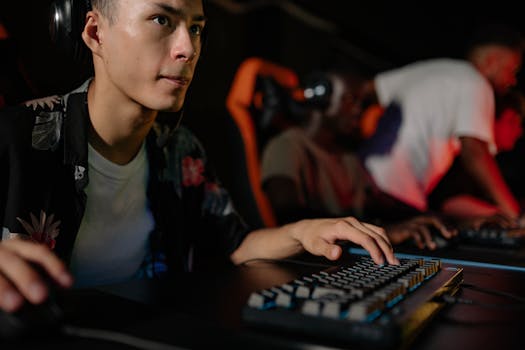How to Handle Toxic Players in Online Matches
Anyone who’s played online games knows the excitement can swing quickly when you encounter a toxic teammate. Sometimes, all it takes is one angry player to spoil the mood.
Dealing with disruptive behavior in gaming matters because it impacts everyone’s experience—from casual players to dedicated competitors. Understanding how to navigate tough interactions keeps games more enjoyable for all.
This guide digs deep into practical approaches, real-world examples, and actionable steps for managing toxic players or negative teammates. Let’s explore these strategies together and help restore fun to your matchmaking sessions!
Recognizing Toxic Behaviors Before They Escalate
Spotting toxicity early is key to preventing its spread in online matches. Recognize patterns like excessive blaming, trolling, or harassment that often flare up as matches get tense.
Think of toxic behavior like a campfire: if left unchecked, small sparks of negativity can quickly turn into an uncontrollable blaze, affecting the entire team and burning up any chance for enjoyment.
- Repeated insults directed at teammates, undermining their confidence and motivation.
- Blaming others for mistakes or losses, which shifts team focus from improvement to conflict.
- Spamming chat or voice commands to disrupt concentration and communication.
- Refusal to cooperate, like ignoring strategic calls or intentionally playing off-objective.
- Harassment through slurs or personal attacks, which often escalates to reportable offenses.
- Sabotaging the game by feeding, going AFK, or intentionally causing losses for the group.
Recognizing these behaviors lets you address them thoughtfully, stopping toxicity before it takes over your match and helping safeguard everyone’s gaming experience.
Responding Calmly in Heated Moments
Imagine you’re playing a critical match and someone starts hurling blame your way for a mistake. Instead of matching aggression, pausing to breathe or count to five can change your entire reaction.
For example, Sarah, a regular online competitor, found that responding to trolls with silence or humor defused most tense situations—sometimes even winning teammates back to a positive mood.
Jalen once simply typed, “Let’s reset and focus on the objective!” during a rough game. Surprisingly, this shifted the momentum and the toxic player actually started helping the team again.
Taking a calm approach can redirect toxic energy into teamwork. Sometimes, your own reaction is the only part of the match you can truly control, so wield it wisely for everyone’s benefit.
Proven Methods to Mute, Block, and Report Effectively
Using available game tools isn’t just about avoiding negativity—it’s a proactive step toward protecting everyone’s match quality. Here’s a breakdown of practical actions you can take during live games.
- Locate the mute feature in your game’s menu. Most titles provide chat and voice mute options, letting you silence disruptive players without needing to leave the match or confront them directly.
- Use the block or ignore function if someone keeps harassing you across several games. This prevents them from contacting or joining your matches in the future, making your sessions more peaceful.
- Access the in-game reporting system after an incident. Detailed reports help moderators spot repeated offenders and maintain community standards, especially if you add context or evidence.
- Document the toxic interaction, such as taking screenshots or saving replays. Having proof allows the moderation team to review incidents accurately, especially if it escalates beyond one match.
- Consider reporting egregious behavior to platform support if it violates terms of service, like hate speech or threats. This elevates the issue for broader action beyond a single game’s moderation tools.
- Encourage teammates to also report if the behavior persists. Multiple reports from different players carry more weight with moderation systems and can lead to actions taken sooner.
- Re-engage only if it feels safe and productive—sometimes a private message post-match can de-escalate misunderstandings, but avoid this step if interactions feel unsafe or abusive.
Combining these methods ensures you’re not only safeguarding your current gameplay but also supporting a healthier gaming community for all participants.
Analyzing Consequences: Letting It Slide vs. Taking Action
Some players choose to ignore toxicity, hoping it fizzles out, while others address behavior directly or rely on moderation tools. Both routes have their upsides and downsides based on timing and severity.
Sliding past minor issues can work for one-off annoyances but risks encouraging ongoing problems if disruptive players aren’t called out. By contrast, immediate action can deter repeat offenses but occasionally sparks tension.
| Approach | Short-Term Outcome | Long-Term Impact |
|---|---|---|
| Ignore | Less confrontation in the moment | May enable repeat offenses and embolden bad actors |
| Mute/Block | Quiets disruption instantly | Cuts off negativity but doesn’t educate or rehabilitate |
| Report | Triggers review by moderators | May lead to warnings, bans, or community improvement |
Referencing the table, it’s clear the best approach depends on the context—sometimes immediate peace works, while other moments call for moderating intervention to reinforce positive play standards.
Encouraging Team Positivity When Negativity Runs High
Promoting a healthy gaming environment is like tending a community garden—nurturing positive interactions yields better results for everyone and can crowd out those persistent “weeds” of toxic behavior.
If a teammate persists with negativity, offering supportive comments or congratulations after good plays can subtly redirect attention. This transforms the tone, making it harder for negativity to take root.
When you act as a “team cheerleader” and celebrate effort, your approach can inspire others to follow your example. Group morale often improves, making teammates more resilient to disruptive influences.
For example, saying, “Great defense, next round’s ours!” after a tough loss helps shift focus from blame to optimism, often sidelining the impact of toxic players before their words gain traction.
Practical Habits for Long-Term Resilience Online
- Take breaks between matches, especially after tense games, to refresh your mindset.
- Regularly review in-game settings to quickly access mute/block/report tools when needed.
- Practice kindness—even a simple “gg” or compliment can change the tone of a tough match.
- Seek out communities or groups with strong moderation and positive reputations for play.
- Keep perspective—remember that others’ behavior often reflects their bad day, not your skill.
- Limit voice chat use if you notice it consistently brings more stress than benefit.
- Reflect on what’s within your control, letting go of gameplay influenced by trolls or negative players.
Building habits like these form a personal “toolkit” for handling toxic encounters, much like athletes develop rituals to shake off setbacks. Over time, it gets easier to stay calm and focused.
By intentionally forming these patterns, you protect both your enjoyment and your progress, creating a foundation for positive play that stands strong even in challenging match environments.
Comparing Experiences: Solo Queues vs. Team Play
Teaming up with friends or pre-made squads feels more secure than solo queueing, where toxic strangers are more likely. Group play lets you manage negativity with support, reducing stress and isolation.
Solo players might develop sharper reporting and self-care skills since they face disruptions alone, while regular groups can create custom codes of conduct or shared responses to any disruptive behavior.
What if even a friendly team faces toxicity from an opponent? Having collective strategies—like synchronized mutes or calmly focusing on objectives—can foster resilience and prevent one bad apple from spoiling the bunch.
Nurturing Better Online Game Environments for All
Handling toxic players in online matches is a skill, not just a reaction. Knowing how to spot, address, and prevent negative interactions preserves the joy of gaming for everyone involved.
As online communities grow, each player’s actions contribute to healthy standards. Choosing calm responses and practical interventions builds trust and respect, making future matches more welcoming for all participants.
Remember, no one controls every interaction, but with the right strategies, you can always shape your own experience. Keep these tools handy for a happier arena, whether you play solo or with friends.
Online play is more than just winning—it’s about growth, connection, and fun. Let’s set the example and make each game a little better for the next teammate who logs on.

